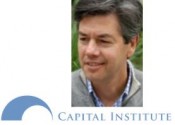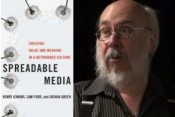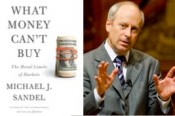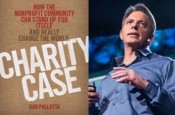Q&A: JOHN FULLERTON – Former Managing Director at JPMorgan & Founding Director, THE CAPITAL INSTITUTE
Written on September 18th, 2014 |
Aired 06/24/12
JOHN FULLERTON has spent a career at the highest reaches of the financial world, including as chief investment officer of a division of JP Morgan.
He is the founder and director of Capital Institute, which describes itself as “a non-partisan, transdisciplinary collaborative space, whose mission is to explore and effect economic transition to a more just, resilient, and sustainable way of living on this earth through the transformation of finance.” That’s a big, bold, and daunting mission and I’m eager to learn how they plan to do that and a sense of their progress so far.
JOHN FULLERTON is also principal of Level 3 Capital Advisors, LLC. whose investments are primarily focused on sustainable, regenerative land use, and food, and water issues. Fullerton is the creator of the weekly Blog, “The Future of Finance” on the Capital Institute
Q&A w/ HENRY JENKINS, SPREADABLE MEDIA – Creating Value and Meaning in a Networked Culture
Written on September 12th, 2014 |
Aired: 04/21/13
“If it doesn’t spread, it’s dead,” is the simple consistent message of a new book, SPREADABLE MEDIA: Creating Value and Meaning in a Networked Culture, that maps the changes taking place in our media environment. For all their consolidation, concentration, and money, corporations can no longer control media distribution. Millions are now directly involved in the creation and circulation of content.
“Stickiness” – focusing attention in centralized places — has been the measure of success in the broadcast era. No more. “Spreadability” – dispersing content through formal and informal networks, with and without permission – is the new goal.
What does this mean for media? For information? For culture? For the distribution of power? And how can you take advantage of the new realities to have greater impact and influence?
I’ll be talking about all of that this week with one of the book’s authors, HENRY JENKINS. He coined the term “participatory culture” and he’s been paying attention for decades to the crowd on the other side of the camera, the microphone, and the screen.
www.henryjenkins.org
www.spreadablemedia.org
Q&A: ROBERT JOHNSON, (INET)
Written on September 9th, 2014 |
Q&A: Michael Sandel – Moral Limits of Markets
Written on August 20th, 2014 |
Aired 04/29/12
Should we pay children to get good grades? Is it ethical to pay people to test risky new drugs or donate their organs? What about hiring mercenaries to fight our wars, outsourcing inmates to for-profit prisons, auctioning admission to elite universities, or selling citizenship to immigrants able to pay?
Phenomenally popular Harvard professor, Michael Sandel, notes that in recent decades, market values have crowded out non-market norms in almost every aspect of life-medicine, education, government, law, art, sports, even family life and personal relations. He argues that we have drifted from having a market economy to being a market society.
In his new book, What Money Can’t Buy, Sandel asks: Is there something wrong with a world in which everything is for sale? If so, how can we prevent market values from reaching into spheres of life where they don’t belong? What are the moral limits of markets?
Q&A: DAN PALLOTTA, CHARITY CASE: How the Non-Profit Community Can Stand Up for Itself and Really Change the World
Written on August 15th, 2014 |
Aired: 04/15/13
When someone approaches you to donate to a non-profit, how many of you want to know how much of of its money goes to salaries and fund-raising and how much goes to actual program services? If you’re like most people, that question probably figures into your decision.
I myself have factored that question of how much is spent on overhead into my charitable giving. But is it a valid or wise way to make such decisions? According to today’s guest, DAN PALLOTTA, while it may be helpful, much more important is how well they serve their mission, how good a job they’re doing solving the problems you care about.
In his earlier book, UNCHARITABLE, Pallotta, who has a record of helping to raise hundreds of millions of dollars for causes, made the case that the way we think about non-profits and the rules we set for them, makes it harder for them to succeed on a truly significant scale. Too many nonprofits, he says, are rewarded for how little they spend — not for what they get done. Instead of equating frugality with morality, he asks us to start rewarding charities for big goals and big accomplishments (even if that comes with big expenses). Where other folks suggest ways to optimize performance inside the existing paradigm, UNCHARITABLE suggests that the paradigm itself is the problem and calls into question our fundamental beliefs about charity.
With a new book, CHARITY CASE: How the Non-Profit community Can Stand Up for Itself and Really Change the World and in a recent very popular TED talk, he says “My goal … is to fundamentally transform the way the public thinks about charity within 10 years.”
www.danpallotta.com
www.advertisingforhumanity.com
